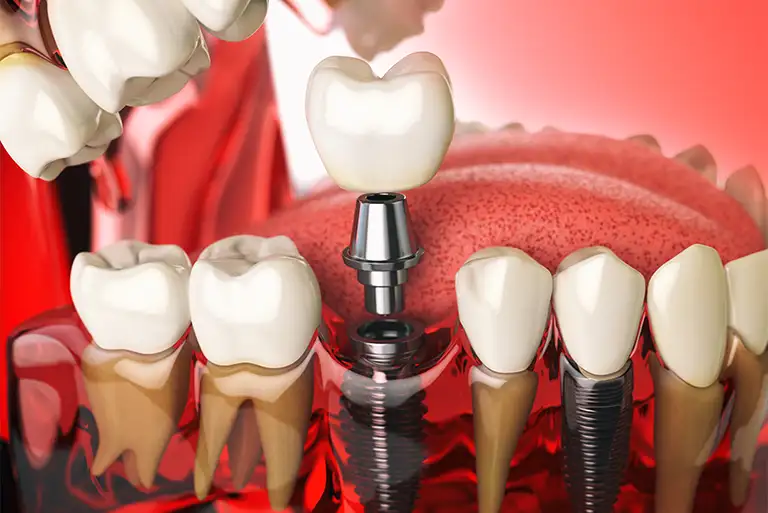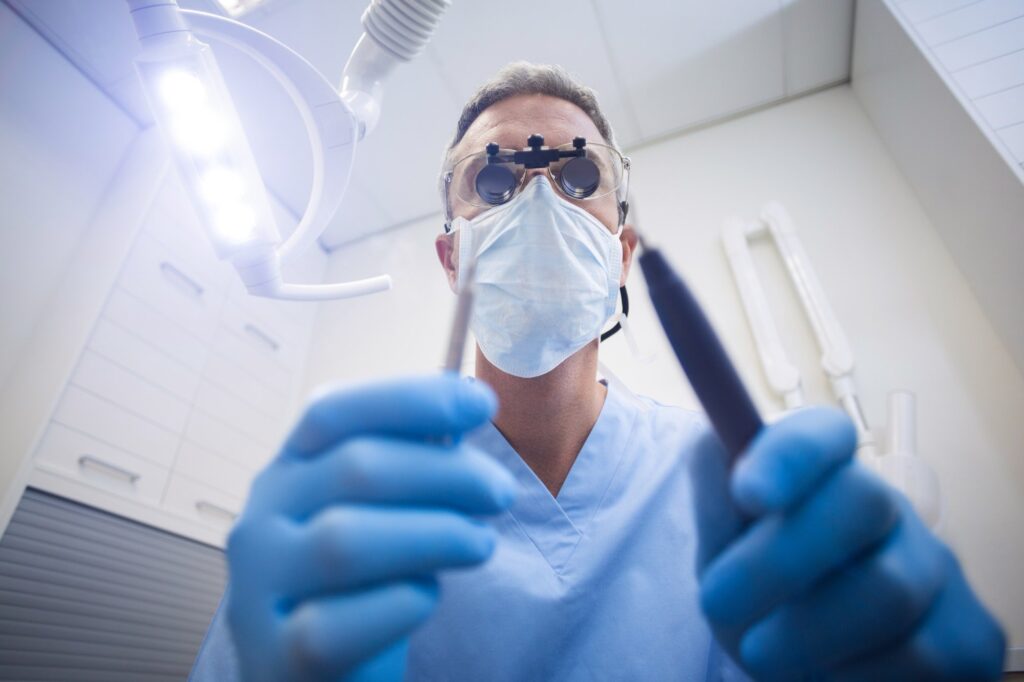Are you struggling with traditional dentures or missing teeth? Did you know there’s a modern dental treatment that allows you to have a complete set of permanent teeth in just one day? All-on-4 dental implants offer a revolutionary way to restore your beautiful smile efficiently and effectively.
Let’s explore what All-On-4 dental implants are and their benefits.
What Are All-on-4 Implants?
All-on-4 dental implants are a restorative dental treatment designed to replace missing teeth. They consist of four screw-like posts strategically placed into the jawbone in areas with the highest bone density. The implants anchor an entire arch of replacement teeth, either fixed or removable.
Unlike traditional dental implants, which may require multiple appointments and extensive bone grafting, All-on-4 implants utilize fewer implants, often eliminating the need for additional procedures. This method ensures a quicker and more efficient way to achieve a full set of functional teeth.
What Does All-on-4 Dental Implant Procedure Involve?
Step 1: Initial Consultation
The All-on-4 procedure begins with an initial consultation with a dental professional. During this appointment, the dentist examines your oral health, including bone density and gum condition. They conduct a comprehensive dental exam and review your medical history to assess if you qualify for the All-on-4 treatment concept. If you are deemed eligible, the dentist provides detailed information about the procedure and answers any questions you may have.
Step 2: Treatment Planning
After the initial consultation, your dentist develops a customized treatment plan for your specific needs. This plan details the number of implants required, the exact placement of each implant, and the type of prosthetic teeth to be used. Modern dental technology, including digital 3D imaging, aids in creating treatment plans for the best possible outcome.
Step 3: Preparatory Treatments (If Needed)
Some patients may require preparatory treatments before the All-on-4 procedure to ensure optimal results. These may include bone grafting or tooth extractions if any damaged teeth are present. Bone grafts might be necessary for patients with significant bone loss to strengthen the jawbone and support the implants effectively. Your dentist will inform you if any additional procedures are needed to prepare for the All-on-4 implants.
Step 4: Implant Placement
On the day of surgery, the dental surgeon will strategically place the four implants into your jawbone. The unique aspect of the All-on-4 technique lies in the angled placement of the posterior implants, which maximizes bone contact and stability. This strategic placement ensures the implants are securely anchored, even in areas with reduced bone density. Depending on the complexity of the case, the surgical procedure may take a few hours to complete.
Step 5: Placement of Temporary Prosthesis
Immediately following the implant placement, a temporary prosthesis will be attached to the implants. This temporary denture allows you to leave the dental office with a functional set of teeth on the same day. The temporary prosthesis will aid in the healing process while providing you with a natural-looking smile and the privilege to enjoy your favorite foods during recovery.
Step 6: Healing and Osseointegration
The healing process known as osseointegration is crucial for the long-term success of the All-on-4 implants. Over three to six months, the bone will integrate with the implants, ensuring a stable and secure foundation. To ensure quick healing and avoid complications, patients should follow a soft-food diet and practice good oral hygiene.
Step 6: Abutment Placement
After the healing period, you will return to your dentist for the final step in the All-on-4 procedure. The dental professional attaches abutments to each implant, which are small metal connectors that hold the prosthetic teeth in place. These abutments are a secure foundation for your new set of permanent teeth.
Step 8: Final Prosthesis Placement
Once osseointegration is complete, the temporary prosthesis will be replaced with a permanent set of prosthetic teeth. The final prosthesis is customized to align with the shape and color of your teeth, delivering a seamless and aesthetically pleasing result. The new set of permanent teeth will be securely attached to the implants, offering excellent stability and functionality.
Step 9: Follow-up Care
You need to attend regular follow-up appointments to monitor the success of your All-on-4 treatment and maintain optimal oral health. Your dentist will schedule periodic check-ups to assess the condition of your implants and ensure there are no issues like gum disease or bone resorption. Practicing good oral hygiene and attending these follow-up visits will help extend the longevity of your All-on-4 implants.
What Are the Benefits of All-on-4 Implants?
Immediate Results
One of the most significant advantages of the All-on-4 treatment concept is the ability to achieve a full set of functional teeth in just one day. The immediate placement of a temporary prosthesis allows patients to leave the dental office with a new smile on the day of surgery.
Reduced Need for Bone Grafting
All-On-4 implants are designed to maximize existing bone contact, often reducing or eliminating the need for bone grafting procedures. This makes the All-on-4 procedure an ideal choice for patients with decreased bone density or bone loss.
Cost-Effective
Compared to traditional dental implants, which may require multiple surgeries and a longer treatment timeline, All-on-4 implants offer a cost-effective procedure for complete mouth reconstructions. The reduced number of implants and streamlined processes contribute to lower overall treatment costs.
Enhanced Stability and Functionality
The All-on-4 technique provides exceptional stability and functionality, allowing patients to chew, speak, and smile with confidence. The angled placement of posterior implants ensures a strong and secure foundation for the prosthetic teeth.
Simplified Oral Care
All-on-4 implants eliminate the need for adhesives or removing dentures for cleaning. Proper dental hygiene, including regular brushing and flossing, is sufficient to maintain the health and cleanliness of the implants and prosthetic teeth.
Improved Quality of Life
All-on-4 implants significantly enhance the quality of life for edentulous patients by restoring a natural-looking smile and improving overall oral health. Patients can enjoy a wide variety of foods and experience increased confidence in social and professional interactions.
What Are the Problems With All-on-4 Dental Implants?
- Initial Cost. The upfront cost of All-on-4 implants may be higher than traditional dentures. However, the long-term benefits and reduced need for future dental treatments can offset the initial investment.
- Risk of Implant Failure. While the success rate for All-on-4 implants is high, there is still a risk of implant failure. Factors such as smoking, poor oral hygiene, and medical conditions can increase the risk.
- Healing Time. The healing process for All-on-4 implants can take several months, during which the patient must follow specific dietary and oral care instructions to ensure proper healing.
- Bone Density Requirements. Adequate bone density is necessary for the successful placement of All-on-4 implants. Patients with severe bone loss may require additional procedures to build up the bone mass.
- Prosthetic Wear and Tear. Over time, the prosthesis attached to the implants may require maintenance or replacement due to wear and tear from daily use.
- Potential Complications. As with any surgical procedure, there is a risk of complications such as infection, nerve damage, or implant misalignment. Regular follow-up care can help detect and address these issues promptly.
How Long Does It Take To Recover From an All-on-4 Implant Procedure?
The recovery time for All-on-4 dental implants varies from patient to patient. Generally, initial healing takes about one to two weeks, during which any swelling or discomfort should subside. The complete osseointegration process, where the bone fully bonds with the implants, usually takes three to six months. Patients should closely follow their dentist’s post-operative care instructions to ensure optimal healing and the success of the implants and can gradually resume their normal activities during this period.
Transform Your Smile With All-on-4 Dental Implants at Casey Dental
All-on-4 dental implants offer a transformative and efficient treatment for individuals dealing with extensive tooth loss or severely damaged teeth. With benefits such as immediate functionality, reduced need for bone grafting, and enhanced quality of life, this dental procedure is an excellent option for achieving natural-looking smiles.
If you are struggling with missing or damaged teeth and seeking a reliable dental treatment, Casey Dental is here to help. Our award-winning dental practice in Pittston, PA, offers All-on-4 dental implants to give you a beautiful, functional smile. Our highly qualified dental professionals are dedicated to providing top-notch care in a comfortable and relaxing environment.
Call us today to schedule your consultation and take the first step towards a healthier, happier smile.
Frequently Asked Question
What are All-on-4 dental implants and how do they differ from traditional implants?
All-on-4 dental implants are a restorative dental treatment designed to replace missing teeth using four screw-like posts strategically placed in the jawbone, anchoring an entire arch of replacement teeth. Unlike traditional dental implants, which may require multiple appointments and extensive bone grafting, All-on-4 implants utilize fewer implants, often eliminating the need for additional procedures, providing a quicker and more efficient restoration process.
What steps are involved in the All-on-4 dental implant procedure?
The All-on-4 dental implant procedure involves several steps: 1) Initial Consultation, where the dentist assesses the patient’s oral health; 2) Treatment Planning, to develop a customized approach; 3) Preparatory Treatments, if needed, such as extractions or bone smoothing; 4) Implant Placement, where the posts are inserted into the jawbone; 5) Placement of a Temporary Prosthesis, to allow for immediate function and aesthetics; 6) Healing and Osseointegration, where the implants integrate with the bone; and finally, 7) Abutment Placement, and the final prosthesis is attached.
What are the benefits of choosing All-on-4 dental implants?
All-on-4 dental implants offer several benefits, including the ability to restore a complete set of teeth in just one day, minimizing the need for additional bone grafting procedures, reducing the number of implants required, and providing a stable and permanent solution to missing teeth. This method ensures a quicker and more efficient restoration of both function and aesthetics.


